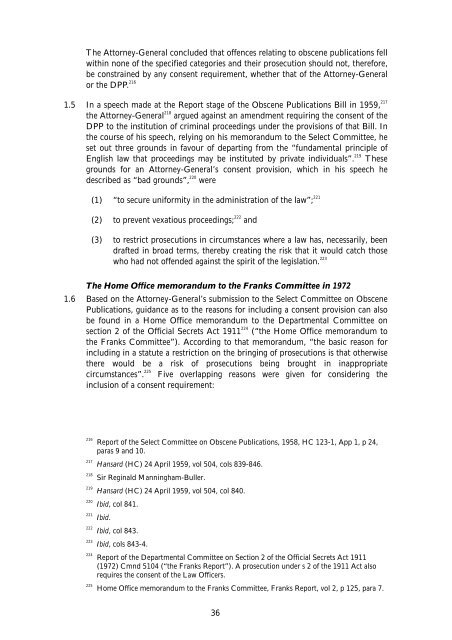cp149 Consents to Prosecution consultation - Law Commission
cp149 Consents to Prosecution consultation - Law Commission
cp149 Consents to Prosecution consultation - Law Commission
You also want an ePaper? Increase the reach of your titles
YUMPU automatically turns print PDFs into web optimized ePapers that Google loves.
The At<strong>to</strong>rney-General concluded that offences relating <strong>to</strong> obscene publications fell<br />
within none of the specified categories and their prosecution should not, therefore,<br />
be constrained by any consent requirement, whether that of the At<strong>to</strong>rney-General<br />
or the DPP. 216<br />
1.5 In a speech made at the Report stage of the Obscene Publications Bill in 1959, 217<br />
the At<strong>to</strong>rney-General 218<br />
argued against an amendment requiring the consent of the<br />
DPP <strong>to</strong> the institution of criminal proceedings under the provisions of that Bill. In<br />
the course of his speech, relying on his memorandum <strong>to</strong> the Select Committee, he<br />
set out three grounds in favour of departing from the “fundamental principle of<br />
English law that proceedings may be instituted by private individuals”. 219<br />
These<br />
grounds for an At<strong>to</strong>rney-General’s consent provision, which in his speech he<br />
described as “bad grounds”, 220<br />
were<br />
(1) “<strong>to</strong> secure uniformity in the administration of the law”; 221<br />
(2) <strong>to</strong> prevent vexatious proceedings; 222<br />
and<br />
(3) <strong>to</strong> restrict prosecutions in circumstances where a law has, necessarily, been<br />
drafted in broad terms, thereby creating the risk that it would catch those<br />
who had not offended against the spirit of the legislation. 223<br />
The Home Office memorandum <strong>to</strong> the Franks Committee in 1972<br />
1.6 Based on the At<strong>to</strong>rney-General’s submission <strong>to</strong> the Select Committee on Obscene<br />
Publications, guidance as <strong>to</strong> the reasons for including a consent provision can also<br />
be found in a Home Office memorandum <strong>to</strong> the Departmental Committee on<br />
section 2 of the Official Secrets Act 1911 224<br />
(“the Home Office memorandum <strong>to</strong><br />
the Franks Committee”). According <strong>to</strong> that memorandum, “the basic reason for<br />
including in a statute a restriction on the bringing of prosecutions is that otherwise<br />
there would be a risk of prosecutions being brought in inappropriate<br />
circumstances”. 225<br />
Five overlapping reasons were given for considering the<br />
inclusion of a consent requirement:<br />
216 Report of the Select Committee on Obscene Publications, 1958, HC 123-1, App 1, p 24,<br />
paras 9 and 10.<br />
217 Hansard (HC) 24 April 1959, vol 504, cols 839-846.<br />
218 Sir Reginald Manningham-Buller.<br />
219 Hansard (HC) 24 April 1959, vol 504, col 840.<br />
220 Ibid, col 841.<br />
221 Ibid.<br />
222 Ibid, col 843.<br />
223 Ibid, cols 843-4.<br />
224 Report of the Departmental Committee on Section 2 of the Official Secrets Act 1911<br />
(1972) Cmnd 5104 (“the Franks Report”). A prosecution under s 2 of the 1911 Act also<br />
requires the consent of the <strong>Law</strong> Officers.<br />
225 Home Office memorandum <strong>to</strong> the Franks Committee, Franks Report, vol 2, p 125, para 7.<br />
36
















